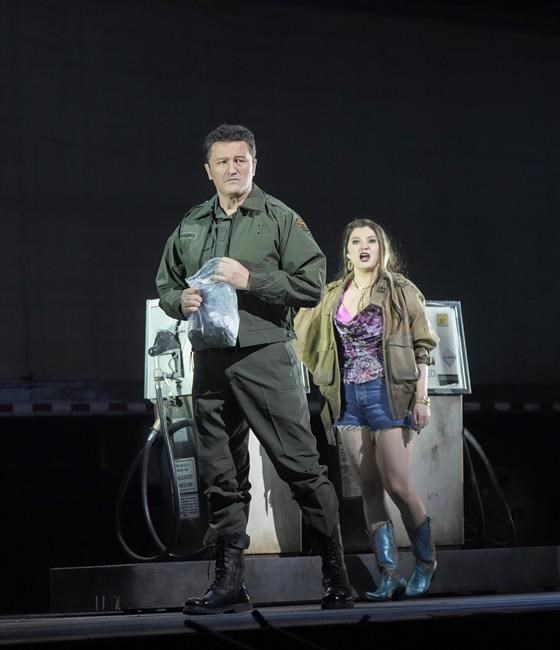
In this undated photo provided by the Met Opera, tenor Piotr Beczala, left, as Don Jose, and mezzo Aigul Akhmetshina, as Carmen, rehearse for the Metropolitan Opera's new production of Bizet's "Carmen" opening on New Year's Eve, Dec. 31, 2023. (Ken Howard/Met Opera via AP)
December 27, 2023 - 8:14 AM
NEW YORK (AP) — Aigul Akhmetshina likes to describe herself as “just an ordinary girl from a small village in the middle of nowhere in Russia.”
Not quite.
Akhmetshina started performing folk songs of her native Bashkortostan while still a toddler. Her family couldn’t afford a piano, so her first instrument was a button accordion. At 14, she left home to study singing in Ufa, the nearest large city more than 100 miles away, where she supported herself at odd jobs like handing out flyers while walking on stilts.
Now 27, this “ordinary girl” is taking on one of the highest-profile operatic assignments imaginable: Headlining a new production of Bizet’s ever-popular masterpiece “Carmen” at the Metropolitan Opera opening on New Year’s Eve.
It hasn’t been an easy journey from Ufa to New York. Along the way, Akhmetshina has had to overcome multiple setbacks, including failures in vocal competitions, an auto accident that left her unable to sing for months, then staking her hopes on a trip to Moscow only to be told by a conservatory that she wasn’t good enough for a scholarship.
“I’m very stubborn, but when you constantly hear you’re not talented enough, you start thinking maybe it’s true,” Akhmetshina said in an interview. “All my achievements happened because I always had people around me who believed in me more than I did.”
Among those people she counts her teacher in Ufa, Nailya Yusupova, who remains her vocal coach, and artists’ manager Marcin Kopec, who first heard her on a “scouting audition” in Russia when she was still a teenager.
“I remember her entering the room, a very confident young lady. She was recovering after the car accident and was wearing a neck collar,” Kopec recalled. “When she opened her mouth, I immediately sat straight. The color of the voice was like a dark chocolate, warm and beautiful.”
Kopec later arranged for David Gowland, head of the Royal Opera’s young artists program in London, to hear her, and Gowland saw enough potential to bring her to London, where she arrived not speaking a word of English.
Her big breakthrough came in 2017 — appropriately with her very first performance as Carmen — in Peter Brook’s condensed version of the opera.
“Her singing and acting gave us a gloriously sultry Carmen,” wrote William Hartston in the Daily Express. “Her strong voice and confident, seductive manner were perfect for the role.”
She went on to triumph in the full work at the Royal Opera, then took a three-year break from the role to explore the bel canto repertory.
But right now Carmen is back with a vengeance.
“I started the season with it in September in Munich, then October in Berlin, now it’s here, after that it’s London, then Glyndebourne, then one more that hasn’t been announced,” Akhmetshina said. “I call this year Fifty Shades of Carmen because I have so many.”
Listening to Akhmetshina talk about the role — a charismatic, fiercely determined woman who doesn’t play by society’s rules — it sounds at times almost as if she’s describing her own life, minus the tragic ending.
“It’s about a woman from a difficult past, a difficult childhood who also dreams about a happy future,” she said. “I’m a fighter. I had to be, and when you have to prove that you own your place, that gives you extra strength.”
That view fits well with director Carrie Cracknell’s gritty production, which moves the action from 19th century Seville to post-industrialist America where many of the men are unemployed and resentful of the women who have jobs. The cigarette factory where Carmen works has become a munitions factory, and Escamillo, the dashing rival to Don Jose for Carmen’s affections, is a rodeo champion instead of a bullfighter.
“I think Aigul has a totally instinctive profound understanding of the world of Carmen,” Cracknell said. “Partly because she has battled so hard to get to this place at such a young stage in her career. The role requires a ferocity and a complete commitment to the story, and Aigul really has that.”
Still, it might seem a gamble to build a new production around so young a singer. She made her debut here just last season in the relatively small role of Maddalena in Verdi’s “Rigoletto.”
But Met general manager Peter Gelb is betting on her.
“Aigul has a rich and gorgeous voice, strong theatrical instincts and presence, and the courage to go for it all on stage,” Gelb said. “Everything in opera is a risk, but Aigul is as close to a sure thing as there is.”
In fact, Gelb has already hired her for future seasons to sing Rosina in Rossini’s “Barber of Seville” and Dalila in Saint-Saens’ “Samson et Dalila.” Down the road, she expects to take on Princess Eboli in Verdi’s “Don Carlo,” and then, perhaps in 10 years or so, the two most dramatic Verdi mezzo roles — Amneris in “Aida” and Azucena in “Il Trovatore.”
“Carmen,” also starring Piotr Beczala as Don Jose, soprano Angel Blue as Micaela, bass-baritone Kyle Ketelsen as Escamillo and conducted by Daniele Rustioni, runs through Jan. 27, with another set of performers taking over in the spring. The Jan. 27 matinee will be broadcast Live in HD to movie theaters worldwide.
News from © The Associated Press, 2023